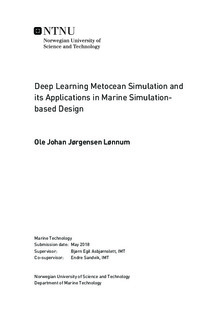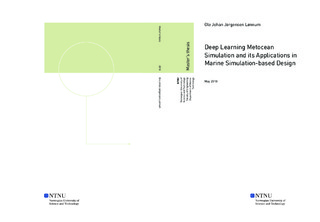| dc.description.abstract | The objective of the master's thesis was to validate the quality of deep learning models as stochastic metocean generators and practicality in the context of simulation-based design. The availability and quality of metocean data is an integral part of simulation-based design and stochastic metocean generators are necessary in many applications to produce synthetic metocean series. Deep learning has shown great results in many domains, but the potential of deep learning stochastic metocean generators is currently unknown. This was the foundation for the first research question: How does the quality of a deep learning stochastic metocean generator compare to simpler traditional stochastic metocean generators? The trade-off between practicality and quality of results in simulation-based design was investigated through the second research question: Can deep learning models be practically used as stochastic metocean generators in simulation-based design applications?
To answer the research questions, a new type of deep learning model called stochastic autoregressive long short-term memory (SAR-LSTM) network model was developed. The SAR-LSTM model was validated in a case study against traditional stochastic metocean generators: Markov chains, VAR and VARMA models. The case study consisted of simulating and matching selected statistical criteria of two bivariate series of significant wave height Hs and peak period Tp. The metocean series were first made approximately Gaussian by a lognormal Rosenblatt transformation introduced in this thesis. Then, a seasonal transformation which removed the yearly periodicity induced by the annual meteorological cycle was applied to make the series stationary. The resulting residuals were then simulated using the different model types before being back-transformed and validated.
The results showed that the SAR-LSTM network model did not adequately match the statistical criteria. The VAR and VARMA models performed exceptionally well in matching the statistical criteria and were found to give a sufficient description of Hs and Tp. The Markov chain models performed better than the SAR-LSTM model, but were subpar to the VAR and VARMA models. Thus, the conclusion to the first research question was that the SAR-LSTM network models produce results of a much lower quality than traditional stochastic metocean generators. The results further showed that the lognormal transformation introduced in this thesis should be used in favor of the commonly applied Box-Cox transformation if matching the joint distribution of Hs and Tp is of importance in the application.
The SAR-LSTM models were found to be unpractical due to the significant time and computational cost for implementing a single stochastic generator. Thus, the conclusion to the second research question was that deep learning stochastic metocean generators are not practical in simulation-based design, unless only a very limited set of unique metocean generators are required. The other models types were found to be practical in simulation-based design.
The VAR and VARMA models were found to be the best choice of models since they had the highest quality of results and were found to be highly practical. The extension from VAR to VARMA model produced better results on some criterion, but came at the price of a higher computational cost for estimating the model parameters. | |

